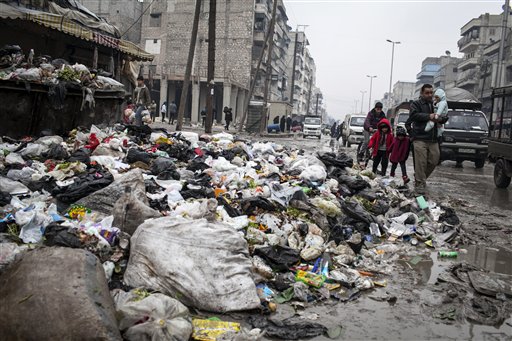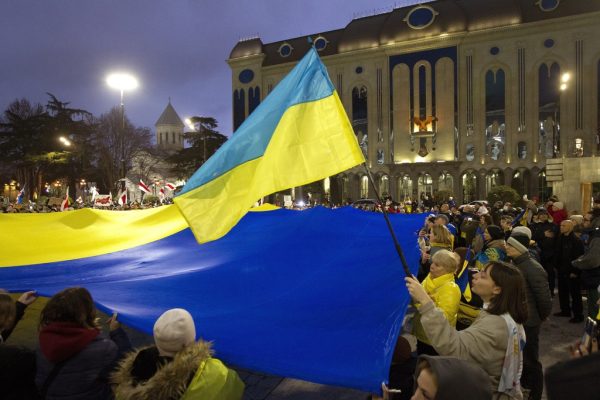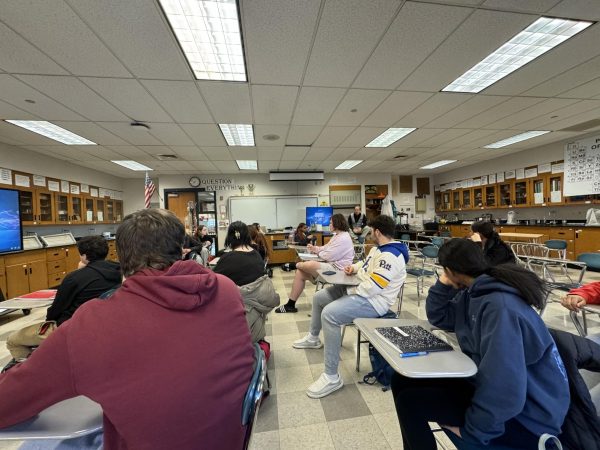EDITORIAL: The Middle East Milk: We spilt it, but should we clean it up?

A family crosses a street piled with rubbish in Aleppo, Syria, Saturday, Jan. 5, 2013. The revolt against President Bashar Assad started in March 2011 began with peaceful protests but morphed into a civil war that has killed more than 60,000 people, according to a recent United Nations recent estimate. (AP Photo/Andoni Lubaki)
It’s called the cradle of civilization, where it all started. Thousands of years ago the people of the Middle East decided that constantly moving and hunting for their next meal was passe and decided to cut the land open, throw some seeds in, water it, and see what happened.
From that fertile ground sprouted not only crops but also civilization as we know it. Complex social structures formed and kingdoms and countries grew. During the following period known as classical antiquity, Abrahamic religions were introduced and while some turmoil was observed, the Middle East stayed rather stable until the first western intervention: The Crusades.
Along with a holy war of epic proportion, these righteous divine interventionists brought with them something even more menacing, bubonic plague. This marked the switch in global power and dominance from the middle east to other parts of the world.
In the 16th century the Ottoman Empire came to power in the middle east and was the glue that held together the tattered pieces of this once great landscape for 400 years.
Following World War One and the collapse of the Ottoman Empire, two colonial idealists came together, one from France and one from Britain, and concocted the Sykes-Picot Agreement. This deal cut up the region and allowed the British and French to colonize it.
They split the region up with blatant disregard for all cultural and social lines. They cut certain factions up and lumped rival groups together based on the territory they were able to attain through negotiation sans any arabic say.
This angered the newly freed Arab states, as the pact was concocted in secret without any Arabic knowledge, and it negated the promise that Britain had made to the Arabs during The Great War, that if they rebelled against the Ottomans, the British would grant them independence.
This policy led to tensions in the pseudo-states that were created. Strong feelings of nationalism bubbled to the surface and instead of the promised representative governments that the British had promised to help set up, strong charismatic leaders arose to “power” in order to fight the western invaders.
This was a key factor behind the rise of the militarist regimes that had come to dominate many Arab countries from the early 20th century until the recent Arab uprisings. Soon the Arabs got what they wanted, a mass European exodus from the Persian Gulf.
However this led to an immediate and massive power vacuum, with factions who didn’t belong together fighting for power in their respective territories. The British also dropped a metaphorical bombshell when they pulled out of the middle east when the crown signed off on the Balfour Declaration.
The Balfour Declaration declared that the British government would be the impetus for the establishment of a Jewish home in Palestine. After nearly a millennia it looked as if the west would finally be out of the middle east. But only myopic politicians, drunk on Scotch and idealism thought that it would last. The damage caused in the region was irreversible.
What followed for half a century was a litany of brutal wars of attrition, too numerous to count. This article would turn into a dissertation if I were to outline all of the conflicts in the region over the last 50 years. However what matters is not the wars, but how we as the western powers and the rest of the world are to react to them.
It’s no secret that every world power’s foreign policy is heavily centered around power plays in the middle east. Take for example the current situation in Syria. In 2011 at the advent of the arab spring in Syria the U.S. backed the uprising as a way to oust president Bashir AL-Assad and his torturous regime.
In order to do this they armed and funded Syrian rebels hoping to have them topple the government. And just like the Mujahideen in Afghanistan a generation ago, one of these factions that the U.S. armed and funded went AWOL and now is the main focus of U.S. military intervention. This newest AWOL group is know as ISIS. So now in order to fight ISIS, we are arming other Jihadists rebels and the Syrian regime.
So when does this stop?
The country or regime or faction does not matter. It could be fighting ISIS in Syria, fighting Hezbollah in Jordan, or stopping the the Iraqi Republican Guard as they swing into Kuwait. All of these conflicts are indirectly or even directly caused by the west. But is it our mess to clean up?
All previous attempts to clean up these countries have proved futile. Attempting to force feed the middle east democracy has not worked and will not work and it’s once again the fault of the west. In an attempt to subdue the region and make sure that the west did not have to deal with any serious uprisings, technological, geopolitical and socioeconomic development was almost entirely stunted. Women still get stoned for adultery. The same garb worn 1,000 years ago is still adorned by all in the region. So a forward thinking representative government will not work for them until the middle east is brought into the 21st century.
Positive western intervention in the Middle East is now half a century old, and the only stable country is a pseudostate that the west created and propped up with inordinate amounts of money resources and arms. (Oh and by the way, Israel in essence formed out of Europeans, as most of the expatriated Holocaust victims sent to Israel were European.)
It’s High time that we reevaluate our priorities overseas. Perhaps instead of a democracy in countries undergoing turmoil, a strong powerful authoritarian leader would better serve the country. Maybe we will have to look the other way when they rule their country with an iron fist because it will bring stability.
What the powers that may be must realize is that in order to obtain stability, some concessions must be made. We cannot expect for Middle Eastern countries to accept our form of government, but if we help them establish a form of government that works for them and brings stability to the region the west should be satisfied and let well enough alone.
In some instances, such as the current debacle in the sands of the cradle of civilization, the end does really justify the means.











